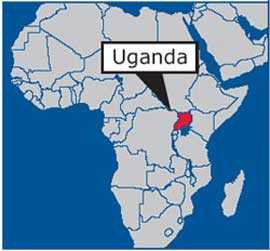In the village of Kok, about 240 km from Kampala, Uganda, Robert Toskin runs his hands through a bag of raw coffee beans. “Coffee is an important cash crop in this area,” says the farmer.
“People grow food for their own consumption, but the revenue from coffee production helps pay for things like education and healthcare, which makes it vital for the local economy.”
Nestled along the wooded slopes of the Mount Elgon ranges in eastern Uganda, Kok sits in one of the country’s most important coffee producing regions.
Climate change however, could be putting this industry in danger. While Kapchorwa coffee farmers benefit from rich mountain soil and relatively predictable rainfall, the effects of climate change have begun to threaten the quantity and quality of the raw beans, driving down prices and hurting exports.
Even small variations in growing conditions, such as changes in rainfall or temperature, can affect coffee’s flavor and hence the value of the product.
Average temperatures have risen by an estimated 1.8 C ° in Uganda over the past 40 years, and farmers like Toskin say this has hurt the quality of their product.
Coffee production, along with prices, has steadily decreased in recent years; from approximately US $4 in 2011, the price per kilogram of Ugandan coffee fell to US $1.30 in 2013.
“People in Kapchorwa and other areas like Rakai, where we have been working, are greatly affected by climate variability and its effects on their coffee crop production,” says Martha Bbosa, UNDP ’s Climate Risk
Management Officer in Kampala. “Even small changes in weather patterns could produce bitter or poorly-flavored beans.”
A UNDP-supported project has found that climate change in Uganda is already having an impact. While long-term effects are not yet certain, heavy rainfall, floods and landslides are already on the rise.
The UNDP report expects that extreme weather events will increase in both frequency and intensity, affecting rainfall patterns and disrupting agricultural practices by reducing the amount of land suitable for coffee production.
This not only hurts local farmers but also the wider Ugandan economy. Throughout the Mbale region, more than 50,000 households depend on coffee production for their income.
At the national level, more than 2 million people are employed either directly or indirectly through the coffee industry, which in 2012 contributed close to US $400 million to the national economy.
“Many people don’t realize this, but Uganda is actually the largest coffee producer in Africa,” says Matthias Nabutele, the Chairman of Coffee A Cup, an organization dealing in coffee export and working with local farmers from across the Mbale region.
And though the government plans on increasing production as part of its long-term development and poverty-eradication strategy, as well as developing processing and distribution, the impact of climate change may very well thwart these objectives, says the UNDP project.
The project, which is part of wider UNDP efforts to evaluate the impact of climate change in 17 high-risk countries, is already demonstrating how people in developing countries will have to alter the way they earn a living to cope with changes in climate.
In Kapchorwa and Rakai Districts, UNDP has provided guidance to the government on how to better prepare communities by bolstering irrigation systems, developing and planting stress resistant crops, and improving seed and food storage, among other measures.
By talking to farmers, the project is also drawing out local knowledge to understand how past generations dealt with periods of uncertainty.
“Coffee growing has been part of Uganda’s lifestyle and the knowledge of coffee growing has been passed over from generation to generation in households,” Bbosa says. “This indigenous knowledge in the face of climate variability and change has been used as a coping mechanism.”
To read more about UNDP’s work mitigating and preparing for the effects of climate change, access the new UNDP report outlining eight years of Protecting Development from Disasters
Source: United Nations Development Programme


















